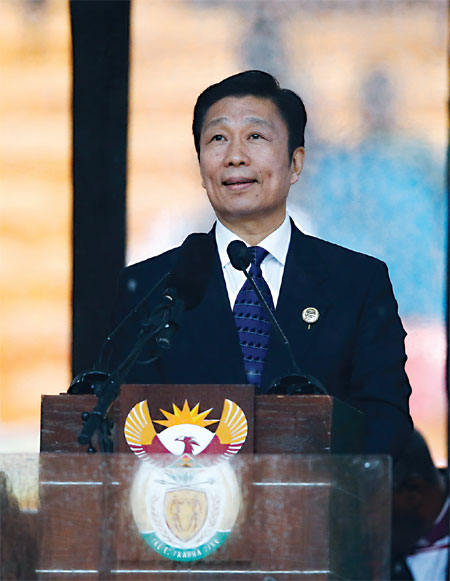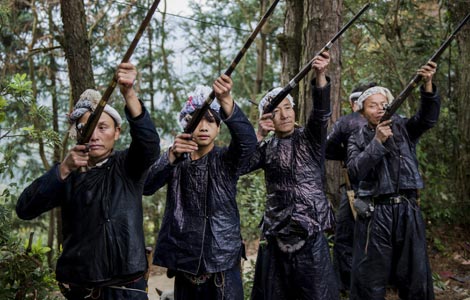News in review Friday, December 6 to Thursday, December 12
Updated: 2013-12-13 12:02
(China Daily USA)
|
||||||||

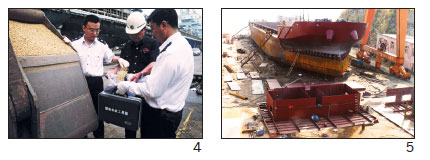
Friday - December 6
Virtual currency Bitcoin can't be used by banks
China's central bank barred financial institutions from handling Bitcoin transactions after investors lost money on fraudulent online platforms for the virtual currency.
"Judging from its nature, Bitcoin is a specific virtual commodity. It does not have the same legal status as a currency and can't, and should not, circulate in the market," the People's Bank of China said in a statement on its website.
Financial institutions are banned from, among other things, trading, settling and market-making deals using Bitcoins, it added.
The central bank said that the virtual currency could be used for reckless speculation, money laundering, drug and gun transactions, gambling and other illegal activities. It could also be used by terrorists to fund attacks, it added.
Coach increases effort to stop e-commerce fraud
Coach Inc, the New York-based design brand, is taking further steps to stop counterfeiting on Alibaba's e-commerce site Taobao.
Under a renewed memorandum of understanding (MOU) with China's largest e-commerce company, Alibaba Group Holding Ltd, Taobao will continue to impose penalties on counterfeit vendors on the platform.
China is the single largest opportunity for Coach and is currently its third largest market after the US and Japan.
There are still hundreds of thousands of online stores on Taobao selling Coach products priced from $9 to $8,863. Not all products are fakes; some are authentic Coach products purchased at Coach stores or outlets and then resold, a service called daigou, or buying on behalf of. (Photo 1)
Monday - December 9
November sees record trade surplus
China's trade surplus in November was its largest trade surplus in more than four years.
The trade surplus in November, $33.8 billion, was the highest since 2009, when the government launched a large-scale stimulus package.
November exports increased 12.7 percent year-on-year to $202.21 billion, while imports stood at $168.4 billion, up 5.3 percent year-on-year, the slowest rise in imports since July, the General Administration of Customs said.
The improvement of overseas demand increased China's chances of securing an 8 percent trade growth target this year. (Photo 2)
Rouble can be used in border city
China will allow the rouble to circulate unrestricted in Suifenhe, Heilongjiang province, the first time that Beijing has given a foreign currency the same legal status as the renminbi on Chinese territory.
The border city Suifenhe has been dubbed the capital of Sino-Russian trade. The move allows Russian visitors to Suifenhe to pay for their meals, shopping and taxi fares in roubles.
Underground currency trading was rampant in the city, and analysts believe that the trial will create a boom of rouble use in the city.
Wang Jianhui, Beijing-based chief economist with stock brokerage Southwest Securities Co Ltd, believes that Russia will reciprocate by allowing the renminbi to trade freely in one of its own border cities.
Tuesday - December 10
CPI slows to a 3-month low in November
China's November Consumer Price Index eased to a three-month low of 3 percent year-on-year from 3.2 percent in October, the National Bureau of Statistics (NBS) said.
Analysts said that the continuing deflation of factory-product prices should raise more concerns than the receding consumer inflation.
The Producer Price Index contracted 1.4 percent in November from a decrease of 1.5 percent in October. The index has remained in negative territory for 21 consecutive months.
The long-term PPI deflation indicates serious problems of industrial overcapacity and weak market demand, which may deeply influence the development of the real economy, said Lu Fengyong, a researcher at the National Academy of Economic Strategy at the Chinese Academy of Social Sciences, a government think tank. (Photo 3)
Alibaba, Haier form logistics joint venture
Alibaba Group Holding Ltd and home appliance maker Haier Group will form a joint venture to build a logistics and service network to deliver household appliances and other large items across China.
The move is Alibaba's latest push to boost its logistics and distribution services. In May it announced a plan to invest up to $16.3 billion over five to eight years in a consortium formed by retailers and courier companies to create a nationwide logistics platform.
"Alibaba desperately needed to team up with someone specialized in large-item delivery to secure its position in the online home appliance shopping market," said Mao Ajing, an e-commerce analyst with the Beijing-based research firm Analysys International.
|
Chinese Vice-President Li Yuanchao speaks at the memorial for service for former South African president Nelson Mandela at the FNB Stadium in Soweto, near Johannesburg. Li concluded his speech by saying: "Although the great man has left, Mandela's thought and his spirit will live forever." Matt Dunham / Associated Press |
Wednesday
- December 11Soybean imports from US soar
Many Chinese companies have turned to cheaper soybeans from the United States in the past three months to avoid potential shipping delays from South America.
The orders, mainly from September through December, were about 4.5 million tons higher than China's soybean imports from the US for the entire 2012-13 market year, the US Soybean Export Council said.
Soybeans are widely used in China for cooking oil and animal feed.
"China's rising demand for soybeans is mainly driven by a change in people's dietary habits. They have shifted away from having mostly grains on their plates to having more oil and meat," said Shen Guiyin, deputy director of the research center of rural economy of China's Ministry of Agriculture. (Photo 4)
Subsidies increased for large shipbuilders
China, the world's biggest shipbuilding nation, will increase cash subsidies for scrapping obsolete ships by 50 percent to help cut overcapacity and emissions.
The government will grant 1,500 yuan ($247) per gross ton for shipping companies to replace obsolete ships, according to a statement on the transport ministry website. The subsidy will apply to vessels scrapped in 2013 through 2015. Chinese shipbuilders also stand to benefit from the subsidy, half of which is awarded only after replacement orders are made. (Photo 5)
Thursday - December 12
US and China are not enemies, report says
The media and others frequently portray the US and China as mutual enemies, but the attitudes of Americans and Chinese toward each other's country are less extreme, according to a survey.
The US-China Security Perceptions Survey, released Thursday by the Carnegie Endowment for International Peace and the China Strategic Culture Promotion Association, showed that low percentages of the US and Chinese public viewed the other country as an enemy - 15 percent in the US and 12 percent in China.
The percentages were even smaller with the US elites (consisting of government officials, scholars, business leaders and others), with 2 percent of the government and 1 percent of business leaders saying they viewed China as an enemy.
But a major takeaway of the report is that "there's a high level of distrust both among elites and the publics in both countries toward the other," said Michael Swaine, lead author of the report.
Exports expected to grow faster in 2014
China's foreign trade is likely to grow faster next year as overseas demand improves, experts said.
The consensus forecast is for total trade growth of up to 10 percent. In the worst-case scenario, total trade may only expand about 8 percent, equal to this year.
China is the world's largest exporter and second-largest importer.
Wei Jianguo, vice-chairman of the China Center of International Economic Exchanges, a government think tank, said: "Foreign trade may expand 10 percent next year, if the government provides powerful support."
Huo Jianguo, president of the Chinese Academy of International Trade and Economic Cooperation, a think tank of the Ministry of Commerce, said that "China's foreign trade in 2014 will be slightly better than this year, with overall trade growing 8 to 9 percent and exports continuing to outpace imports".
|
Performers wearing horse-head masks in Ciqikou, an ancient town in the Shapingba District of Chongqing municipality, on Dec 10. They were taking part in a live-art piece encouraging people to work hard and realize their dreams in the Year of the Horse. Yu Xiao / Asia News Photo |
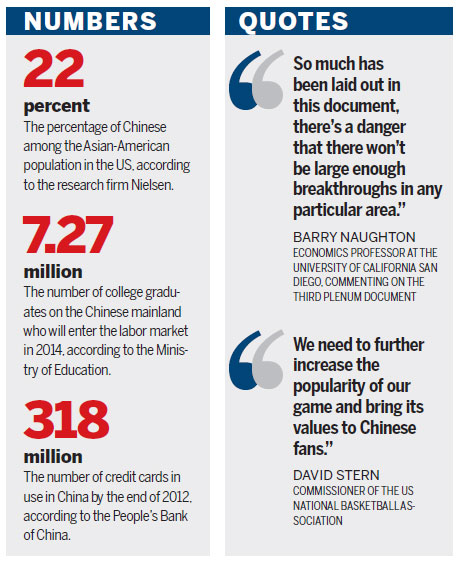
(China Daily USA 12/13/2013 page8)

 New York mulls banning e-cigarettes
New York mulls banning e-cigarettes
 Climbers soar to new heights
Climbers soar to new heights
 Reading China's future through its past
Reading China's future through its past
 Yanukovich offers Ukraine protesters nothing
Yanukovich offers Ukraine protesters nothing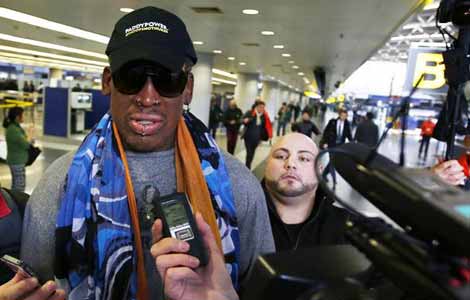
 Former NBA player may coach in DPRK
Former NBA player may coach in DPRK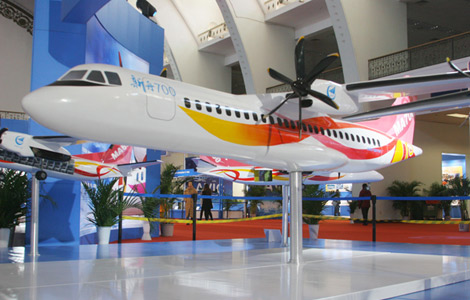
 AVIC unveils plan for next-generation regional aircraft
AVIC unveils plan for next-generation regional aircraft
 Misses International shine in Tokyo
Misses International shine in Tokyo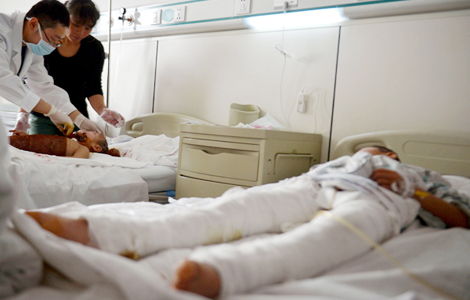
 Parents urged to supervise children's TV-viewing habits
Parents urged to supervise children's TV-viewing habits
Most Viewed
Editor's Picks

|

|

|

|

|

|
Today's Top News
China, US start annual trade talks
New York mulls banning e-cigarettes
Verizon plans more data-request disclosures
88 injured in London theater collapse
'Deportation relief' important to Asian Americans
Reading China's future through its past
New US ambassador 'must find right mix'
Senators push Iran sanctions bill
US Weekly

|

|
